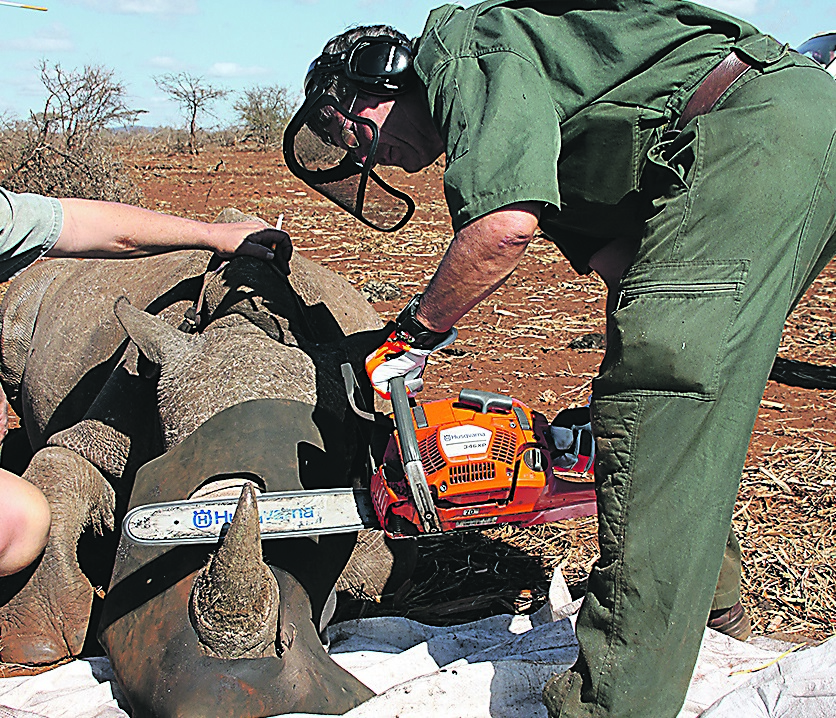
When most surgeons go to work on their patients, they reach for a scalpel. But that’s not the case for KwaZulu-Natal veterinarian Dr Mike Toft, a rhino-dehorning specialist.
He cranks up his trusty chainsaw when he performs the potentially life-saving procedure on this endangered species in a bid to ward off poachers.
Toft, of Kifaru Wildlife Vet Services in Zululand, and his team have dehorned more than 200 rhino on private reserves in the province in a little more than a year and are set to remove the horns of another 60 in the next few months.
The dehorning programme, which Toft is spearheading, is aimed at deterring poachers. A rhino horn can sell for up to R150 000 locally and up to R5 million in Asia, where it is used in traditional medicine.
The debate over whether or not to legalise the trade in rhino horn has polarised public opinion in South Africa. Save the Rhino lobby group says on its website that it “has not yet reached a conclusion on whether the trade in rhino horn should be legalised or not”.
“We are currently considering the cases for and against the proposal,” the organisation said.
The group has argued that legal trade on its own will not work; others argue that anti-poaching patrols on their own will not work.
The debate in South Africa is also exploring a combination of approaches that could be adopted to ensure that rhino population numbers continue to grow.
The horn is removed above the growth layer of the skin, and it grows back within three years in adults and within 18 months in younger beasts.
“I approached my clients with the idea late last year because the poaching pressure in KwaZulu-Natal has been relentless,” Toft said.
“Zululand Rhino Reserve was the first to come on board and, since then, we’ve carried out the process at almost all of the private rhino-owning reserves in the province. We can never take the foot off the petrol here,” Toft told City Press this week.
“We have to continually remove the horns. With the young rhinos, aged between two and four, we need to dehorn every 18 months. In the more mature rhinos, we need to dehorn every three years,” he said.
Toft, who has dehorned rhinos as young as one, said that while there were risks involved in the process, they hadn’t lost a patient yet.
“The risk is always there – any anaesthetic procedure carries a risk. We are very fortunate as a team. We’ve so far managed without any mishaps. It’s more risky in a rhino because you don’t know what their health risk is, as you would a human patient.”
Toft uses battery chainsaws provided by power tools company Husqvarna, one of the sponsors of the programme, to cut the horn, and a blower to cool down his hefty patients. On a busy day, the veteran vet dehorns between 12 and 14 rhinos, with the process being dependent on the weather. His record for a single day is 17.
He said the process, which involves an assistant and about 10 staff members from each reserve, costs between R8 000 and R10 000 per animal.
“There are direct and indirect costs. The direct costs include the vets’ time, drugs, helicopter flying time and equipment. The indirect costs include the time, labour and vehicle costs incurred by the reserves.”
He said the campaign had already seen a decrease in the number of poaching attempts.
“What we had not anticipated is a decrease in rhino-on-rhino injuries. Because of the severe drought, reserves have to feed animals artificially at the moment. This results in rhinos congregating around the feeding points, and there is pushing and shoving. Without horns, there are reduced injuries,” he said.
“We are also picking up that there are less injured or dead bull rhinos during clashes as a result of them not having horns.”
Toft said state reserves had decided to undertake the process on smaller reserves.
“Poaching pressure has reduced, and only two rhino on private reserves have been lost – and that was before the dehorning process started. I believe we can reduce poaching by up to 80% by dehorning,” he said. “So far, it’s good news.”




 Publications
Publications
 Partners
Partners








